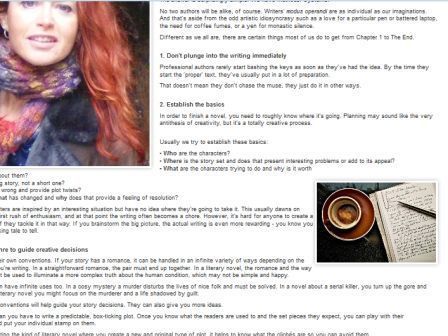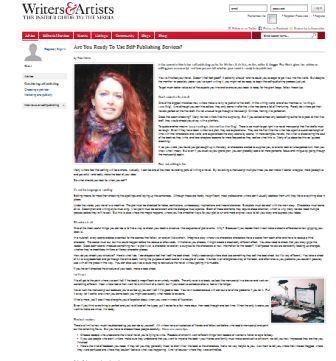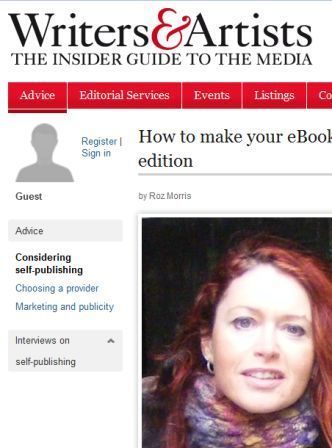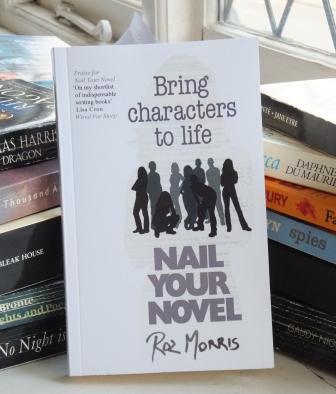Roz Morris's Blog, page 82
June 26, 2013
‘Melancholy, softly-haunted halls’ – The Undercover Soundtrack, Leah Bobet
 Before she was a writer, my guest this week was a musician. Proficient on piano, guitar and French horn, her most cherished instrument was her own; she yearned to be an opera singer. That didn’t work out, but she says she still feels ruled by the visceral power of music. Her stories come from musical phrases and metaphors that don’t explain themselves. Sometimes she writes by candlelight. She is award-winning urban fantasy author Leah Bobet, and she’s on the Red Blog with her Undercover Soundtrack.
Before she was a writer, my guest this week was a musician. Proficient on piano, guitar and French horn, her most cherished instrument was her own; she yearned to be an opera singer. That didn’t work out, but she says she still feels ruled by the visceral power of music. Her stories come from musical phrases and metaphors that don’t explain themselves. Sometimes she writes by candlelight. She is award-winning urban fantasy author Leah Bobet, and she’s on the Red Blog with her Undercover Soundtrack.


June 24, 2013
How to gather ideas and turn them into a novel – post at Writers & Artists
 You know a project is going to be long, serious and brow-furrowing if the illustration is a scribbled-on notebook and coffee. My third piece for the Writers & Artists website is up today. The web editor saw Nail Your Novel and asked me to write a run-down of points to help first-time writers get started on a magnum opus.
You know a project is going to be long, serious and brow-furrowing if the illustration is a scribbled-on notebook and coffee. My third piece for the Writers & Artists website is up today. The web editor saw Nail Your Novel and asked me to write a run-down of points to help first-time writers get started on a magnum opus.
Readers of Nail Your Novel will be familiar with it all – notes, plans, splurging first drafts, confidence-building (and coffee), but if you haven’t been here long you might find it useful. Follow your nose…


June 23, 2013
Your story needs two hearts
 Stories need two hearts. I’m going to call them the warm heart and the dark heart.
Stories need two hearts. I’m going to call them the warm heart and the dark heart.
The warm heart is the bond we feel with the central characters. It is the pleasure of spending time in their company. I hesitate to call it liking; it may not be so simple. Our attachment may be to just one person and their flaws and troubles, or it may be to a web of relationships. It is affection, but rough-edged. It is warm, but it might not be cuddly. It’s push and pull, trouble and strife, idiocies and idiosyncrasies. But it is where the reader feels at home.
And then there is the dark heart. The dark heart is jeopardy. The shadow at the end of the alleyway. The characters may have other problems in the story. They may fight miscellaneous foes. But the dark heart is an ultimate disturbance that will demand a day of reckoning.
Two long-running TV shows illustrate this in action. Fringe has both hearts. The central characters form a story family. Some of them are bonded by filial ties: the father, Walter; the son, Peter. There’s Olivia, the FBI agent who becomes Peter’s lover. There’s Astrid, a lab assistant sidekick who becomes a close friend. They are the warm heart of the show; the humans who have real and complex relationships and sally forth to do battle. And Fringe has its dark heart. The characters are on borrowed time; every day brings them closer to a confrontation they cannot escape.
One heart down
By contrast, Doctor Who, whose title character actually has two hearts, only has one of them working.
The story’s warm heart is in good shape. The Doctor and his TARDIS companion always have a vibrant relationship that brings us back week after week. We also get drop-ins from the extended story family: the Doctor’s wife; the occasional friendly alien he befriended while saving them. Previous companions are also available. This creates a galaxy family bonded by experience and affection.
The warm heart beats strongly. But the dark heart does not.
Now that might seem like nonsense. Doctor Who is all about getting into danger and fighting monsters, right? But they don’t treat these as seriously as they treat the character universe.
The threats are often negligible. Too often, the Doctor wins with a gadget, some fast-talking, an asspull or a vague wave of the omnitalented sonic screwdriver. He never has to raise his game to win. And the scriptwriters frequently bend the rules of their own show – thus disrespecting their own universe.
Although each series has an overall arc, which is where the dark heart should be beating its dreadful rhythm, it is false. It never produces a confrontation that will really put the Doctor on his mettle, or that could credibly destroy him. Even if the writers trick it up to look like that, he’s usually freed in one bound, and does not have to go through the wringer.
Because the writers don’t make us believe in the dark heart, the warm heart loses some of its power. You could say this demonstrates that we need the story to be taken as seriously as the characters are. Controversial.
Fringe goes one step further to genius. Here is why: the warm heart created the dark heart. Walter Bishop committed a crime that started an epic war. His son died, and so he opened a wormhole to a parallel universe and stole him back. The flawed warm heart let the dark heart in.
In a great story, the warm heart and the dark heart pump each other with life. The dark heart makes the warm heart more precious. And the warm heart makes the dark heart more terrible.
Thanks for the hearts pic Joselito Tagarao and the Fringe pic hherbzilla
Let’s discuss some stories – film, TV or prose – with warm and dark hearts. Buffy, anyone?


June 19, 2013
‘Through the cold, lonely streets of NYC’ – The Undercover Soundtrack, Terrence McCauley
 My guest this week says his friends assume his crime novels are inspired by other noir thrillers, but they’d be wrong. His novels have all come from songs. An opening scene sprang from Springsteen; the relentless grind of a fight from House of Pain; a tender moment from the soundtrack to Gladiator. He is Terrence McCauley and he’s on the Red Blog with his Undercover Soundtrack.
My guest this week says his friends assume his crime novels are inspired by other noir thrillers, but they’d be wrong. His novels have all come from songs. An opening scene sprang from Springsteen; the relentless grind of a fight from House of Pain; a tender moment from the soundtrack to Gladiator. He is Terrence McCauley and he’s on the Red Blog with his Undercover Soundtrack.


June 17, 2013
Are you ready to use self-publishing services? Post at Writers & Artists
 Yes, I would usually have posted an original writing post this weekend, but I seem to have had a lot of posts on other blogs in the last few days. So rather than appearing in your inbox way too many times in one week, I thought I’d take a bit of a rest.
Yes, I would usually have posted an original writing post this weekend, but I seem to have had a lot of posts on other blogs in the last few days. So rather than appearing in your inbox way too many times in one week, I thought I’d take a bit of a rest.
Today I’m back at Writers & Artists. They told me a lot of writers approach them for advice on self-publishing and self-publishing services, but it’s clear they’re not ready and would be better doing more work themselves. They asked me for a piece to help writers hone their novel before they pay for editorial services.
The number one problem I notice is that new writers try to publish a first draft – so this post is a newbie’s guide to revision and an insight into the secret graft behind a good novel. Many of you guys are more advanced than that, but if so, I hope you’ll know someone you can pass it on to. Even if it’s only your long-suffering family and  friends, who are wondering why you haven’t ‘finished’ and published! Here it is…
friends, who are wondering why you haven’t ‘finished’ and published! Here it is…
Meanwhile, if you’d like to share how you revise a novel, or add your tips for getting it in perfect shape for publication, share them here!


June 12, 2013
How not to bore the reader with trivial details – book excerpt at Jane Friedman
 Trivia is the stuff of life but you can easily have too much. There’s a fine line between sketching a realistic amount and boring the reader with shoals of baffling blather.
Trivia is the stuff of life but you can easily have too much. There’s a fine line between sketching a realistic amount and boring the reader with shoals of baffling blather.
Today, Jane Friedman has showcased an excerpt from the characters book on her blog, and she chose the tutorial where I explain this tricky balancing act. If you’re curious about the book – or if you simply want to know how much of your carefully crafted background to include – come on over and see.


June 11, 2013
‘Belle & Sebastian are truly a band made for writers’ – Scott D Southard, The Undercover Soundtrack
 My guest this week says his wife has forbidden him to air certain overplayed albums in her presence. Of course, they are the ones that provided the souls of his novels; drew him to the writing desk; catapulted him into the worlds of his characters. Readers here will be well acquainted with the idea that once a song joins your writing repertoire, you never tire of it (although your family might). For his latest novel, he was drawn to songs of desperation, and the finely drawn character vignettes of Belle & Sebastian – a band he says are truly made for writers. When you see that the title of his novel is A Jane Austen Daydream, you might be surprised that its music is so contemporary. But has there ever been a time when Ms Austen didn’t feel bang up to date? Scott D Southard is on The Red Blog with his Undercover Soundtrack.
My guest this week says his wife has forbidden him to air certain overplayed albums in her presence. Of course, they are the ones that provided the souls of his novels; drew him to the writing desk; catapulted him into the worlds of his characters. Readers here will be well acquainted with the idea that once a song joins your writing repertoire, you never tire of it (although your family might). For his latest novel, he was drawn to songs of desperation, and the finely drawn character vignettes of Belle & Sebastian – a band he says are truly made for writers. When you see that the title of his novel is A Jane Austen Daydream, you might be surprised that its music is so contemporary. But has there ever been a time when Ms Austen didn’t feel bang up to date? Scott D Southard is on The Red Blog with his Undercover Soundtrack.


How to make a print book using Word – first of a series at Writers & Artists
 Gosh, this is grown-up. After I gently pointed out to Writers & Artists that some self-publishers are as adept in print as in e-publishing, we got chatting. They were interested in my background (running an editorial department, writing, editing, book production and this blog!) and the result is I’m doing a series at Bloomsbury’s Writers & Artists site on fundamentals for good self-publishing.
Gosh, this is grown-up. After I gently pointed out to Writers & Artists that some self-publishers are as adept in print as in e-publishing, we got chatting. They were interested in my background (running an editorial department, writing, editing, book production and this blog!) and the result is I’m doing a series at Bloomsbury’s Writers & Artists site on fundamentals for good self-publishing.
This first piece is on turning an ebook file into a print edition. It’s an expanded version of a pair of posts I wrote when I released the paperback of My Memories of a Future Life, and hopefully a little more simplified for first-timers. If you want to know more about how to make lovely-looking books, come on over.


June 9, 2013
Which choice? Create compelling characters by giving them dilemmas
 The rock star had a seizure in his hotel room. He recalled little of it; just a long fight to breathe. As he came to, the other band members were telling the paramedics he’d be fine for the night’s gig, a doctor would take care of him. He didn’t want to let them down, of course, but he felt like death.
The rock star had a seizure in his hotel room. He recalled little of it; just a long fight to breathe. As he came to, the other band members were telling the paramedics he’d be fine for the night’s gig, a doctor would take care of him. He didn’t want to let them down, of course, but he felt like death.
His girlfriend had witnessed the unremembered time: 10 minutes of jerking, clawing and choking, pleading for help; the brutal rescue where paramedics only just got him back. She saw the other band members playing down the dangers, arguing with the medics. She wanted to tell them how bad he was before any of them arrived, and how long it went on for; except he was so fragile that might trip another attack. And none of them would listen.
Who is in the worse situation? The rock star or the girlfriend?
If it was real life the answer is a no-brainer. But in story terms, it’s worse to be the girlfriend. So she’s the character we’re more interested in, the more natural focus for our curiosity. But many novice writers would make the rock star the central character.
Why is the girlfriend more fascinating to readers?
She has the heavier burden. She knows that if she could muster enough guts, wits and nous, she could stand up to the band and save her lover. Her conscience is telling her so. But she is outnumbered, has no clout, and even the boyfriend will listen to them rather than her. She is trapped and isolated with her problem. And even if he gets through this show, what about the next and the next? She is burdened with guilt and responsibility. He is burdened only with biology.
When writers want to make us concerned for a character they often try to enlist our sympathy with a trauma or a timebomb. But the reader knows the writer can use a timebomb as the whim takes them; either the rock star dies or doesn’t. Choices and decisions, though, exploit what stories do best; they pit characters against each other, against their own failings, fears and weaknesses. In the above scenario, although the reader might be concerned for the rock star as a fellow human being, they’ll really feel for the girlfriend.
Great stories make us walk in a character’s emotions. A terrific way to do that is to give characters difficult choices. Can she stand up to these people? Does she have the courage to do the right thing? What would it kick off? Will she muster the ability to convince people? We can follow this struggle. If she does the wrong thing, she carries it like a wound herself, but one that was made by the story and her own actions.
Thanks for the dilemma pic Unkreative.
 In other news, I just got the ‘Top website for Self-Publishers’ award from the
In other news, I just got the ‘Top website for Self-Publishers’ award from the Alliance of Independent Authors. This badge is, according to their email, a benchmark to signify ‘excellence, integrity, creativity and helpfulness in the indie self-publishing world’. If anyone reading this helped it along – thank you. And if you liked this post, there is plenty more advice on getting the reader on your MC’s side in the Nail Your Novel characters book.
Alliance of Independent Authors. This badge is, according to their email, a benchmark to signify ‘excellence, integrity, creativity and helpfulness in the indie self-publishing world’. If anyone reading this helped it along – thank you. And if you liked this post, there is plenty more advice on getting the reader on your MC’s side in the Nail Your Novel characters book.
Okay, back to the subject. Let’s talk about stories where the writers get us rooting for the characters by the dilemmas they face. Indeed, have you done this in one of your stories?


June 4, 2013
‘I woke from a wondrous and startling dream’ – The Undercover Soundtrack, Mark Staufer
 I’ve often thought we need to be able to film our dreams. While we’re at it, can we please record the fully orchestrated music we compose in them? While I’ve slumbered, I’ve written albums that surpassed my favourite artistes, and when my eyes open they’re gone. My guest this week clearly thinks the same way. He woke from a dream and wished he could preserve it on film… not surprising as he is a screenwriter and former head of production at Universal Studios. From this idea began a supernatural thriller – but it’s no ordinary book. He worked with a composer and sound designer to create a multimedia app that’s a book when you want to read and a musical experience when you choose to open your ears. And of course there are the secret pieces that showed him the souls and truths of his characters. He is Mark Staufer, and he’s on the Red Blog with his Undercover Soundtrack.
I’ve often thought we need to be able to film our dreams. While we’re at it, can we please record the fully orchestrated music we compose in them? While I’ve slumbered, I’ve written albums that surpassed my favourite artistes, and when my eyes open they’re gone. My guest this week clearly thinks the same way. He woke from a dream and wished he could preserve it on film… not surprising as he is a screenwriter and former head of production at Universal Studios. From this idea began a supernatural thriller – but it’s no ordinary book. He worked with a composer and sound designer to create a multimedia app that’s a book when you want to read and a musical experience when you choose to open your ears. And of course there are the secret pieces that showed him the souls and truths of his characters. He is Mark Staufer, and he’s on the Red Blog with his Undercover Soundtrack.







